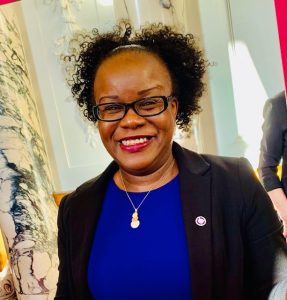
October is Black History Month, an annual celebration of the contributions of Black people to British society. Read here to see how we have celebrated Black History Month. Join us as we continue our Black History Month celebrations with interviews featuring people within and outside the CPS.
Our first interview is with Bernadette Thompson, who is a Deputy Director in the People Capabilities and Change Directorate at the Ministry of Housing, Communities and Local Government, and Co-Chair of the cross-Civil Service Race to the Top G6/7 Network.
What do you think about when you hear ‘Black History Month’?
Black History Month is a time to pause and reflect on where we have come from and focus the metaphoric ‘camera lens’ a bit better on the step change we need to achieve to ensure that the lives of Black people all over the world matter. I recently wrote a blog about my full reflections on Black History Month, you can read more about it here.
Which Black person from history or today inspires you?
My most favourite Black person from history is Rosa Parks. Like Rosa, I refuse to be treated in a shabby, shoddy and unfair manner because of the colour of my skin. I believe in speaking up, speaking out and taking action to create change. Thank you, Rosa Parks, and all the selfless civil right campaigners who helped to create the fairer society that we live in today.
Why is it important for the civil service to celebrate Black History Month?
A snippet of history. After visiting America in the 1970s, Ghanaian-born Akyaaba Addai Sebo, a special projects officer at the Greater London Council, founded the UK’s version of Black History Month in 1987. Now back to the actual question. The Civil Service wants to be the most inclusive employer in the UK; therefore, it is important for us to understand better the diverse make up of our UK population. 3.3% of the UK population are from a Black ethnic group (2011 Census), so understanding their lived experiences in the different spheres of life, the contributions that they make and the challenges that they face, will enable us to bring these perspectives into improving our policymaking the policies that we make.
What would you do (for a career) if you weren’t doing this?
If I wasn’t doing this job, I would probably be a lawyer. Fairness and equity are at the heart of what I stand for. I would want to ensure that justice is served to people who have been discriminated against or treated unfairly. Another career which I would have loved to pursue is acting. I love the theatre, most especially musicals, I have a big voice, love to act and I can hold a tune, so let’s see what the future holds!
Ten years ago, who did you think you would be now?
I knew I would be making a significant difference to the lives of Black, Asian and minority ethnic (BAME) colleagues in the civil service or public sector. It is important to me not to just exist in an organisation, but make a genuine contribution, to effect change for the next generation.
Have you ever had something happen to you that you thought was bad but it turned out to be for the best?
I am a Christian and this shapes how I approach setbacks, ‘career potholes’ or more generally any adversity. I believe there is always a reason and a lesson that can be learnt from any experience and applied in the future. My early career in operations was fraught with challenges, unfairness and difficult circumstances; however, this has built my resilience and given be a ‘Teflon’ coating allowing me to survive and thrive amidst challenging circumstances.

Yessssaass Bernie!!!! BeautyFULL ??❤️?? Thanks for ALL that you do i.e. the seen and the unseen encouragement, support and inspiration for racial equity in the workplace. Stay Strong my Sistah’. Your thankful Brother Rob ??
Excellent article, Bernice. Most of us from the BAME community, particularly those of us from an African or Caribbean background, pretty much need to be born with or develop “teflon” qualities in order to withstand some of the challenges we continuously face.